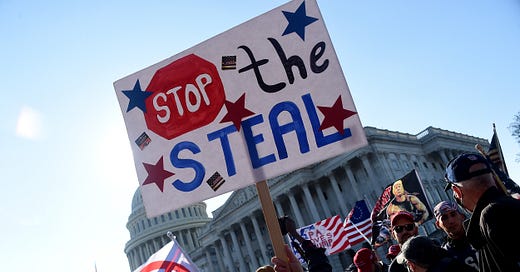The GOP Scheme That Could Bring Our Electoral System to Its Knees
An underappreciated part of the Trump attack on our democracy: mass voter challenges.
DESPITE DONALD TRUMP’S FLOP in last week’s debate against Kamala Harris, polls still have the race close. Naturally, most observers are trying to figure out who will win—meaning who will better persuade voters to register to vote, go to the polls, and vote for either candidate. But a better question to ask at this point is whether Trump and the Republican party machinery will succeed in their myriad efforts to cheat their way back into the White House. And this round, they are recruiting regular voters across the country to do the dirty work for them.
A “mass voter challenge” involves individual voters calling into question the eligibility of hundreds or thousands of voters all at once. Frivolous mass voter challenges picked up after the 2020 election and the viral spread of the Big Lie after Trump lost dozens of legal challenges and audits. Rather than focusing on lawsuits over vote counts, private groups with Republican backing are now reportedly pre-emptively challenging perceived deficiencies in voter eligibility in a bid to “clean up” voter rolls before the election.
From September 2023 to May 2024, there was a 55 percent increase in the number of these challenges in Michigan alone, according to an analysis by Protect Democracy. Forty-five additional states allow them in one way or another. The details of the process—the way a challenge is lodged, the grounds for a challenge (like residency, age, or citizenship), the kind of evidence required for success, and the procedures for resolving whether a voter gets kicked off the rolls—vary significantly by state. And although there are legal barriers to wiping large numbers of voters from the rolls in swing states, that doesn’t need to be accomplished for the Trump effort to have a devastating effect on the election. The real goal: overwhelm, chaos, and delay.
In some states, the burden is on the challenged voter to prove their eligibility by filing an affidavit or attending a hearing. For many people, it just might not be worth the effort; others might just feel bullied or intimidated into not voting. Election workers are already preparing for anticipated threats of violence with panic buttons and bulletproof glass. Mass voter challenges could push the difficulties of managing an election past the breaking point. “They are just going to beat the system into the ground,” one former Michigan elections official told the New York Times in 2022 before that year’s midterms, when 6 people managed to file 89,000 challenges to individual voters’ eligibility in that state.
Two right-wing groups are at the forefront of orchestrating mass voter challenges. Election Integrity Network was started by Cleta Mitchell, a Trump enabler who was on his infamous 2020 call with Georgia election officials urging them to “find 11,780 votes.” The group developed a technology called EagleAI, which was designed by a retired physician to facilitate voter challenges on a huge scale using snippets of voter data from criminal records, property tax information, and the U.S. Postal Service’s National Change of Address database. Its advocates have called the relatively low-tech tool “Excel on steroids.”
True the Vote has created a similar platform called Independent Voter Verification and Validation (IV3), which applies an algorithm to match names from voter rolls with change-of-address information. Under both systems, amateur sleuths intent on finding election fraud can log in to investigate and evaluate voter eligibility using stuff they find on the internet and social media. If they perceive a problem, True the Vote will help them file a formal challenge. EagleAI prepares an automated challenge that the user can then file with state election officials.
This new method of assault on electoral integrity is affecting not just candidates but individual voters, too. According to Wired, Gamaliel Warren Turner Sr., a 69-year-old veteran, was told in 2021 by the Muscogee County, Georgia registrar’s office that his name was on the list of thousands of voters whose registrations were under investigation. He had lived in Georgia since birth and voted consistently for fifty years, but his job took him to California for a time in 2019, so he had the USPS temporarily forward his mail. True the Vote sent his name along with nearly 4,000 others to the leader of the Muscogee County Republican Party, who in turn submitted challenges to the county board of elections. Turner ultimately got his ballot counted in the 2021 Georgia Senate runoffs, but only after filing a lawsuit. Georgia election officials fielded over 360,000 voter challenges filed by True the Vote in that race.
For the most part, these challenges have been unsuccessful thus far. After a trial in a case called Fair Fight v. True the Vote, a federal judge ruled that True the Vote’s actions in Georgia did not amount to voter intimidation, despite its having “offered a $1 million ‘bounty’ for reports of voter fraud [and] recruited Navy SEALS to confront voters and poll workers . . . just two weeks before the January 2021 runoff election.” The judge nonetheless called out True the Vote’s role in “facilitating a mass number of seemingly frivolous challenges,” stating that their list of allegedly sketchy voters “utterly lacked reliability. Indeed, it verges on recklessness.”
According to Protect Democracy, Georgia, Michigan, and Texas face “perhaps the highest risk” of being adversely affected by election deniers’ mass voter challenges this cycle, with Georgia and Michigan being two of the battleground states that will likely decide this election.
But keeping eligible voters from the polls is not the only threat posed by mass voter challenges. CREW reports that Georgia and Michigan—along with three other critical swing states, Arizona, Pennsylvania, and Nevada—also have “rogue election officials” on their rosters who have already “unlawfully refused to certify elections since 2020.”
The potential legal remedies for this mischief are hardly reassuring. They include, according to CREW, emergency court orders compelling officials to “comply with the law,” criminal charges, and removal of “obstructionist officials from their county positions.” But the time constraints and complexities of each of these remedies may make it difficult to stop the worst from happening before November. And if an election can’t be certified due to voter eligibility challenges, and if an emergency petition were to make it to the Supreme Court, that body’s current right-wing majority cannot be expected to intervene on voters’ behalf. A contested election could toss the decision to House Republicans under the Twelfth Amendment.
Those of us worried about the threat Donald Trump poses to American democracy often think in terms of what he might do once elected or in the aftermath of another lost election. But threat to democracy is already unfolding—now.






